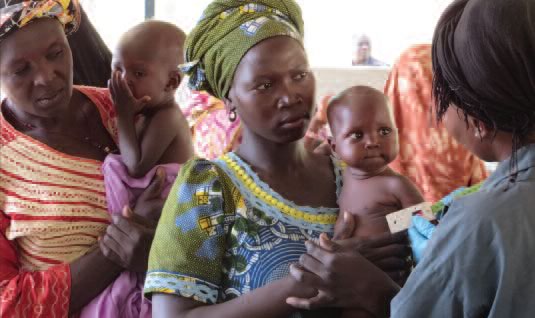The effectiveness of blanket supplementary feeding programmes in preventing acute malnutrition: evidence from research carried out in Chad
 ENN briefing note 2013
ENN briefing note 2013
Paluku Bahwere et al.
Available at www.ennonline.net
To date there have been few studies on effectiveness of Blanket Supplementary Feeding Programmes (BSFPs) in preventing a deterioration in nutritional status at the individual or population level. ENN in collaboration with WFP, Oxfam Intermon, Centre de Support en Sante International and the Chad Ministry of Health at country level carried out research into a BSFP designed to prevent an increase in acute malnutrition during the 2012 food crisis in children aged between 6 and 23 months in Magalme, Chad.
Target children received 200 g/day of Super Cereals plus, lactating mothers received 220 g/day of Super Cereals plus and severely food insecure households received a family ration (450 g sorghum, 60 g pulses, 25 g oil and 5 g salt). Households with vulnerable children and classified as severely food insecure received both the Super Cereals plus for the child and the family ration.
Key findings
- The package of interventions (BSFP, cash, WASH and food price control interventions) prevented the typical 5% increase in rates of acute malnutrition in the context of a severe food crisis, high staple food prices and annually high level of acute malnutrition in the hunger season.
- Survey results indicate a decrease in mortality rates in the intervention area during the hunger period.
- A significant number of previously well-nourished children (34.6%) went on to develop acute malnutrition during the follow up period despite the package of interventions.
- Growth velocity analysis suggests that successive hunger seasons contribute significantly to the increase in the prevalence of stunting and the effective mitigation of seasonal hunger on nutrition outcomes should not only be regarded as an intervention to combat acute malnutrition but also as a strategy to reduce stunting rates.
- MUAC <135 mm and WLZ <-1 at the beginning of the hunger season were independent predictors of acute malnutrition and could be considered as selection criteria when food commodities are scarce.
- Maternal nutrition status, defined by MUAC, is a predictor of risk to the child of developing acute malnutrition during the hunger season.

